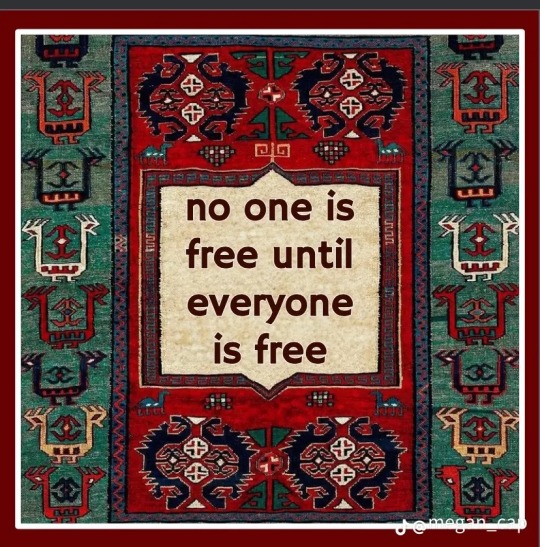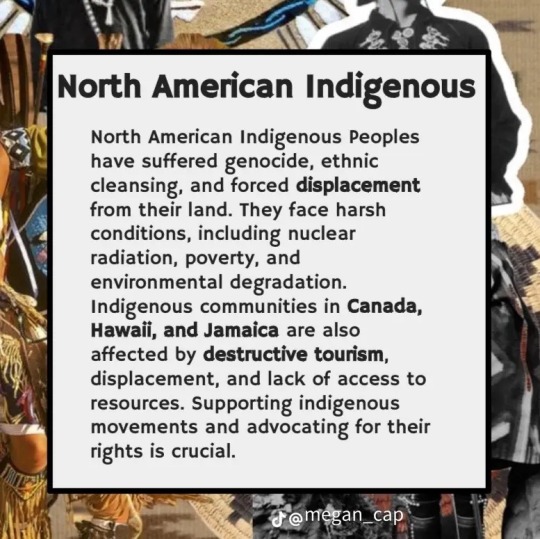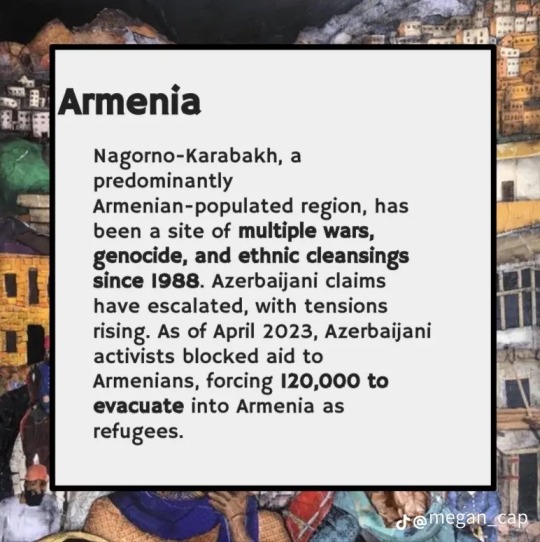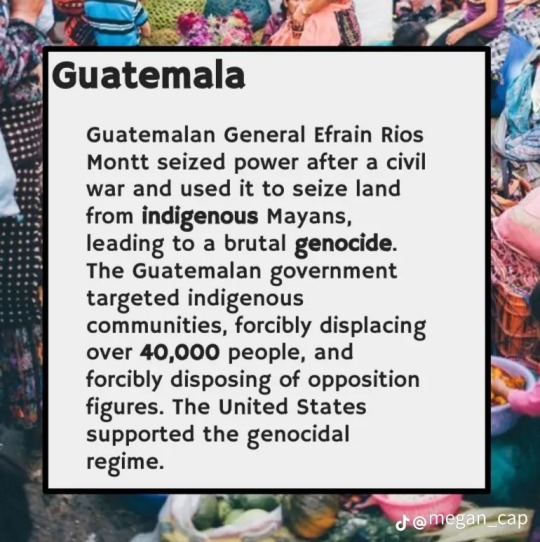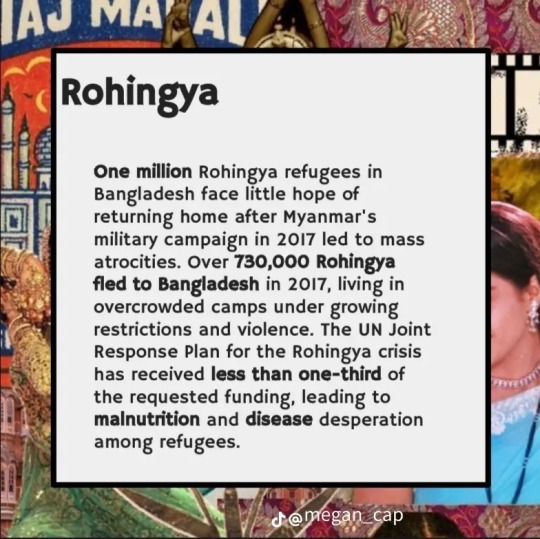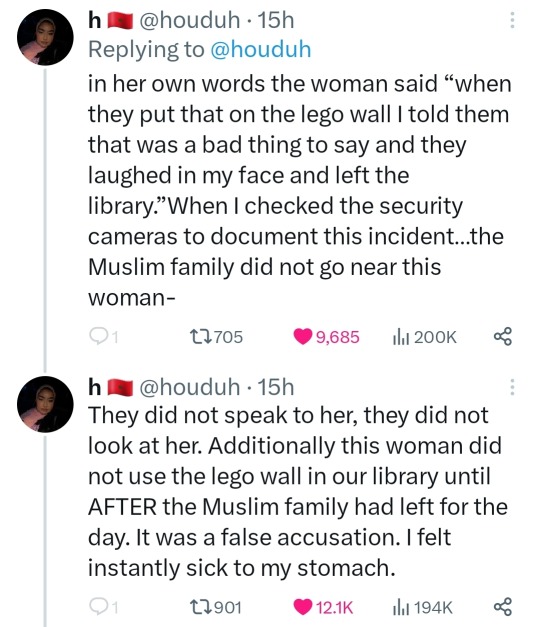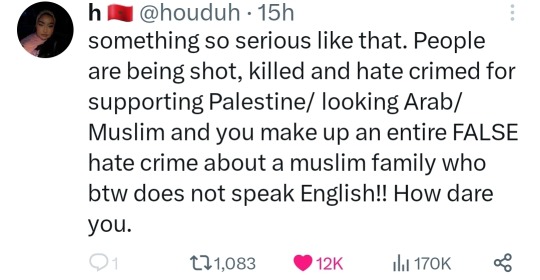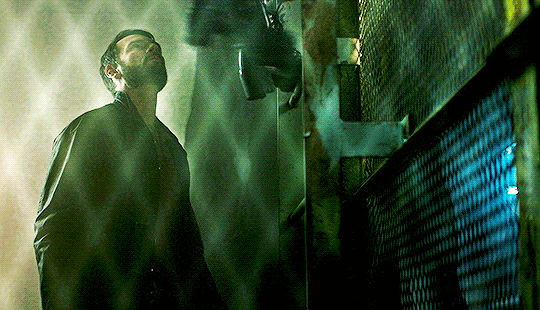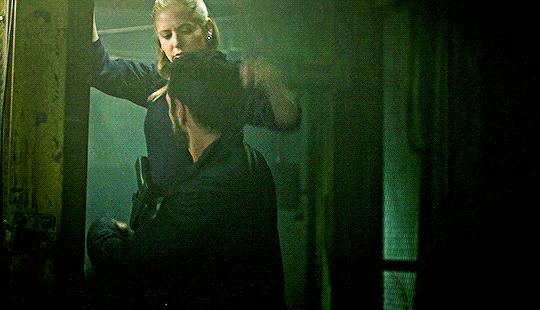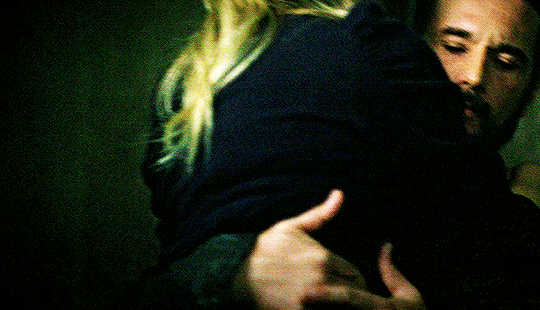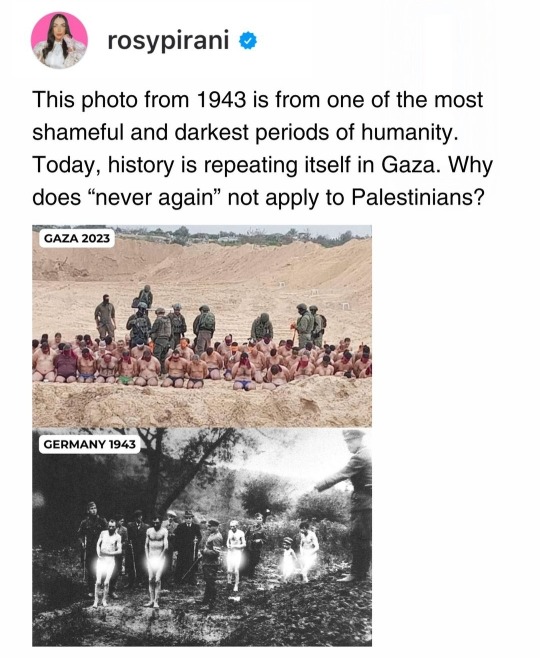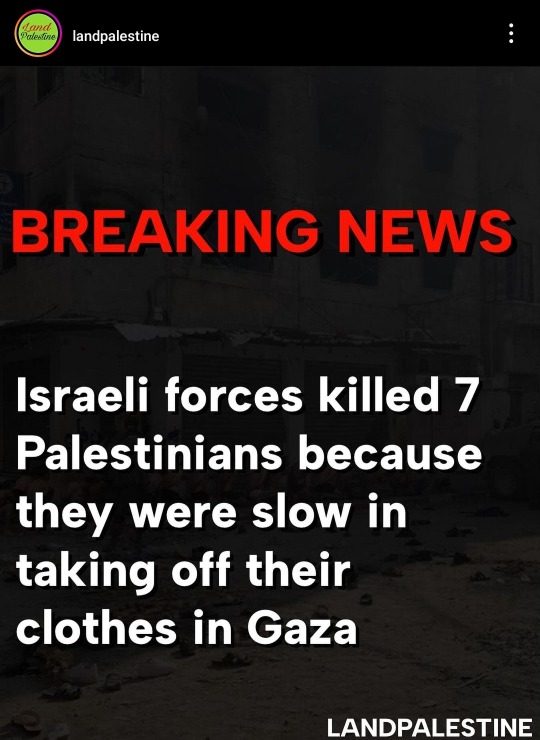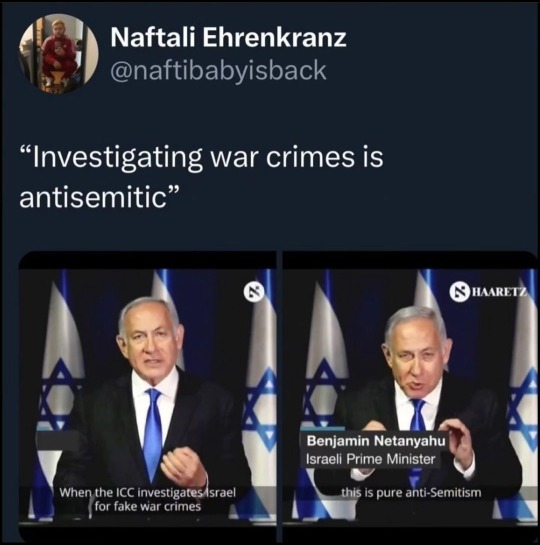Don't wanna be here? Send us removal request.
Text





Hi everyone! I've been wanting to recreate this hair, inspired by NI-KI from Enhypen (especially since I saw them live in October). I wasn't sure whether to include the strands on the left side, so I've made 2 versions. I hope you enjoy it a lot, I'd love to see it in your game :)

-2 versions
-Maxis match
-Base Game compatible
-Male, teen to elder
-Hat compatible
-All LODs
-Disabled for random
-Restricted for opposite frame
-EA swatches
-Custom thumbnail

-Patreon (Early access until 02/01)

-Please don’t reupload to other sites
-Please don't edit this hair, you can recolor but tell me first
-Enjoy!💜
795 notes
·
View notes
Text





Hello everyone! Ever since I saw this music video I've wanted to recreate Hyunjin's look. At first I only thought about doing the hair, but I ended up doing the glasses as well. I hope you like how it turned out and enjoy it a lot!

-Maxis match -Base Game compatible -Male, teen to elder -Hat compatible -All LODs -Disabled for random -Restricted for opposite frame -EA swatches -Custom thumbnail
-Eyeglasses available for both genders, with 16 swatches

-Patreon (Early access)

-Please don’t reupload to other site
-Please don't edit this hair, you can recolor but tell me first
-Enjoy!💜
1K notes
·
View notes
Text

fun mods to enhance realism and gameplay (all links mentioned)
hi tumblr! i posted a video showcasing some new mods i've found recently and am in love with. here are all the links of the mods i've mentioned in the video.
misc mods
reading book cover override by simkatu
reading sitting position override by simkatu
simu online degrees (discover uni required) by midnitetech
simu online skill classes (bgc) by midnitetech
functional tattoo chair by cepzid creations
simcity transport by vyxated
beach activity mods
functional hammock by warronkcc
functional volleyball court by warronkcc
functional surfboard by warronkcc
fitness mods
healthy living mod by adeepindigo + pandasama
jog together mod by zerosims4mods
ballet skill by janesimsten
functional ballet barre by mercuryfoam
you can watch gameplay / functionality of all of these mods here
6K notes
·
View notes
Text
Look I realize I'm not the age demographic for Wolf Pack, but if I wasn't supposed to watch it they wouldn't put this man
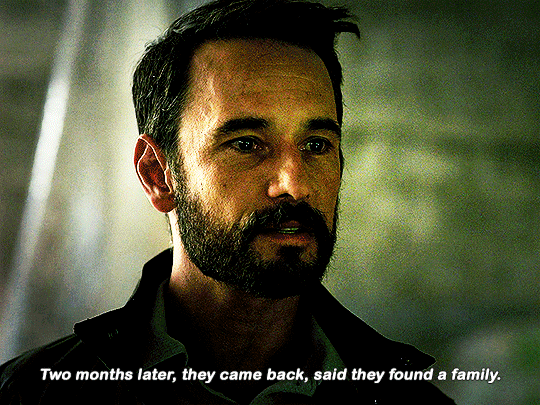
And this woman

On my screen together?!
19 notes
·
View notes
Text
look at this? if you like :)
other videos are on my tiktok:
18 notes
·
View notes
Text
3 notes
·
View notes
Text
i need to recreate this truck i saw with my eyes while driving on the highway today gimme a sec
56K notes
·
View notes
Text
the naruto world is perfectly fine and nothing should change in it ever...
Konan, Nagato, Sasuke…they all had the right idea. The whole shinobi system is built on fascist death cults with economies built on the trade of murder as a resource. How do you watch/read Naruto and see fucking twelve-year-olds being indoctrinated with the ‘Will of Fire’ bullshit and being taught how to kill/expected to kill people (including other children) and think, ‘wow, this is just some typical fun, shallow shonen, amirite?’ do you read the hunger games and think the games are just a fun device to have people fight each other, and not a commentary on socioeconomic equality and the horrors of capitalism? naruto literally begins as a story about a twelve-year-old orphan who seeks to become a child soldier because that’s the only way his society will ever give him love or recognition, because his society is built on murder and the way you find acceptance is to commit murder. literally the entire prestige/ranking system of naruto is built on how good characters are at murder, how many people they’ve murdered, with the fan favourites being the most adept murderers. how does this just not read as ‘fucked up’ to you at all?
206 notes
·
View notes
Text
One of the scariest things about Hashirama is when he mentioned how much Sasuke resembled Izuna, that Madara wouldn’t want to harm Sasuke due to of how much he looks like his beloved brother and that could be taken advantage of.
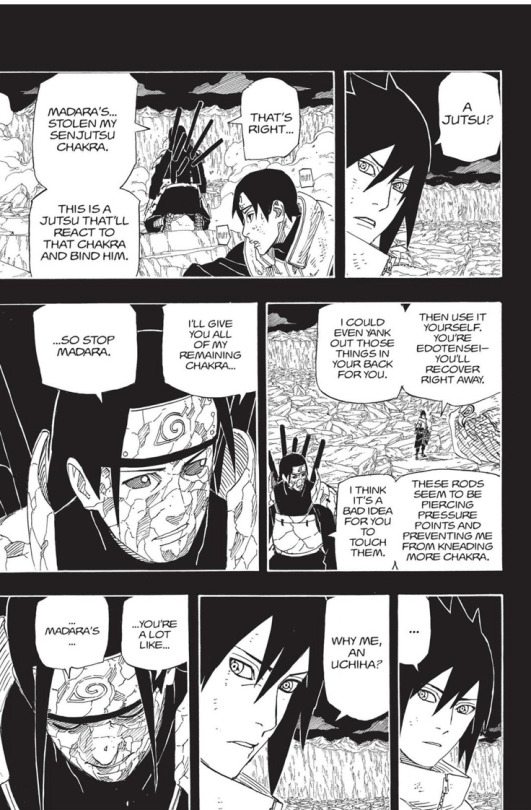
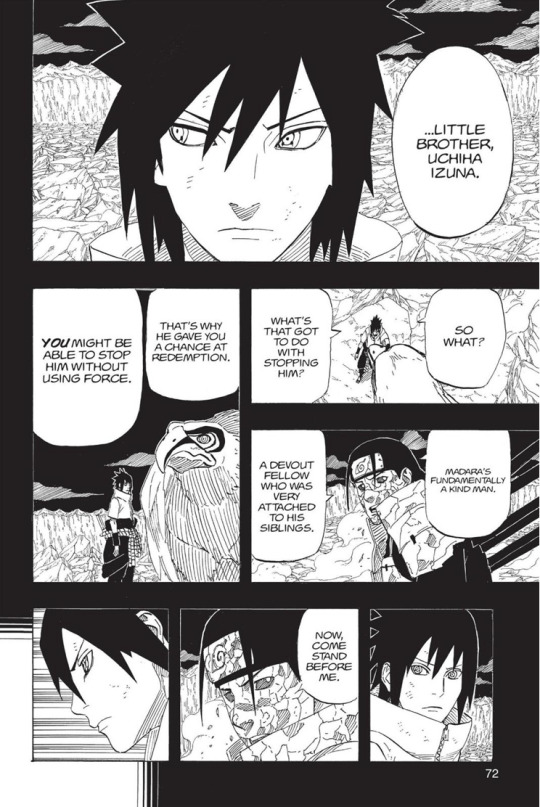
Madara might had seen through Hashirama’s plan since he rephrased what the shodaime told him when he used Madara’s weakness to stab him from behind, - indicating that he would give up his loving nature for closed ones in order to achieve his goal, even if in front of his eyes is the silhouette of his beloved brother, just like how Hashirama did.
“In order to protect something... Something else gets sacrificed. Be they friend, brother... or even my very own child.”
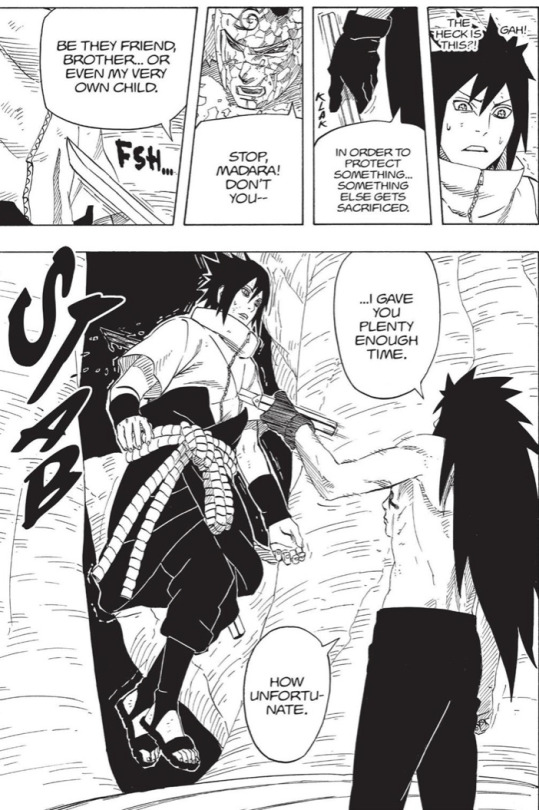
But you know what the bitter thing is? Hashirama was right. Madara couldn’t get rid of his sentimental nature for closed ones like how Hashirama did. He gave Sasuke time - chance to not to be killed - before deciding to kill him (“I gave you plenty of time. How unfortunate.”) He didn’t really want to kill Sasuke unless he had to. And did he finish the boy? No, he just stabbed Sasuke and left him there, still alive and even had chance to get medical support.
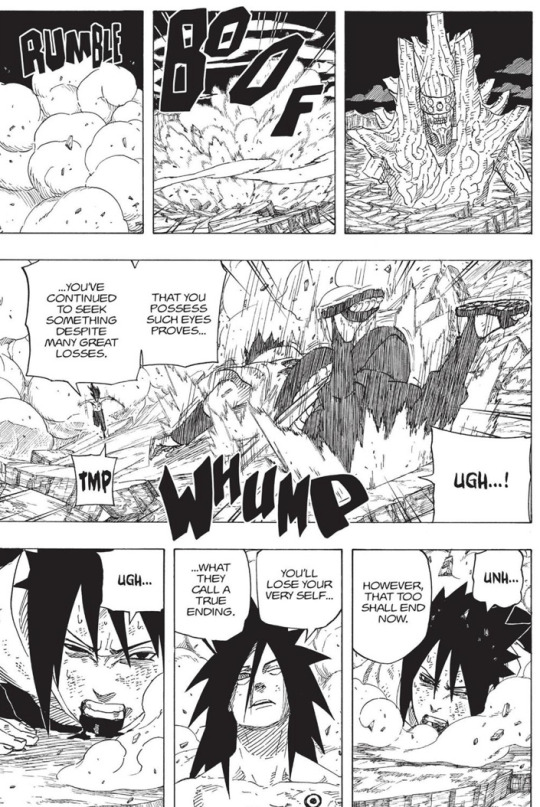
“You’ll lose your very self... What they call a true ending.”
Madara had wanted to lose himself to achieve his goal. But he didn’t, or didn’t even realize the part that lies with Izuna - his loving nature for his brother - stayed.
252 notes
·
View notes
Text
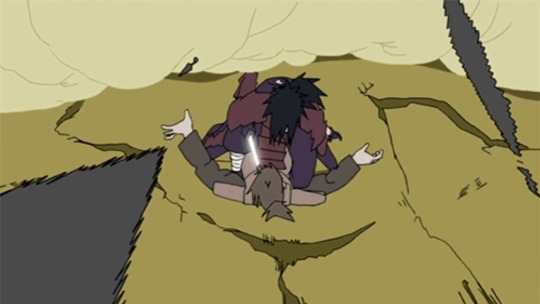
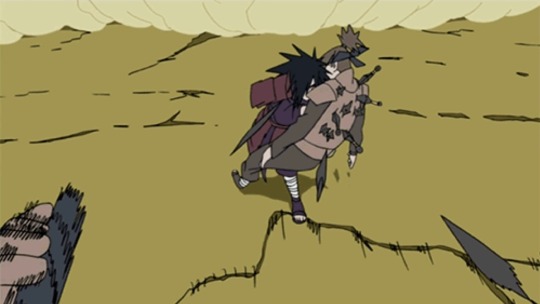
UGH okay while making edits, I just realized Madara kills this guy with his own sword, picks his corpse up, and it as a SHIELD against the kunai. Fucking savage bro.
19 notes
·
View notes
Text
Fascism and The Leaf: Tobirama's Legacy, Pt.1
The thing is, Fascism isn't a static ideology, but rather it's a miscellaneous agglomeration of various political and philosophical ideas, which makes it a hive of contradictions. In and on itself, fascism lacks even a single essence, or quintessence, and because of this it's often used as a pars pro toto designation for several authoritarian ideologies.
The Leaf isn't just a totalitarian entity - base them as military authoritarianism if you prefer, but there's no escaping the fact that its precepts are rooted in fascism, as these boil down to a hotchpotch of antithetical ideals roughly sewn together. Many of them are in fact very blatantly inconsistent.
What I intend to do here is illustrate how the the Leaf suffered a distortion, as it was moulded into a fascistic entity after its birth, and not at its conception, with the Senju's influence (but specifically Tobirama's) being the caveat.
This'll be part one of a series of analyses. Enjoy and please do consider giving this a reblog!
Konohagakure was initially perceived as a new revolutionary order, avant-garde almost, and the Senju, especially Hashirama, were seen as the conduit for pioneering this change:
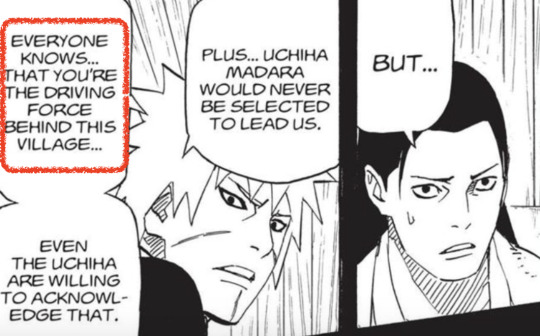
"Everyone knows that you're the driving force behind the village..."
Tobirama is such a subtly adroit manipulator, because not only is he the only one that's heavily shouldering this specific narrative, but it serves a duplicitous scope.
To devise a democratic election, one that's held exclusively for this instance, ensures consolidation of power in the hands of the Senjus, with Hashirama as Hokage.
It was always Hashirama who possessed a charisma that moved the masses, what with his jovial "golden retriever" energy, while Madara was never really the crowd-pleasing type, he himself states this and upon defeat he draws attention to the complete lack of adherents:

This doesn't necessarily equate to Madara having little to no importance within the sphere of village founding, but that Tobirama deviates the focus, diminishing Madara's contributions, to assign greater gravity to Hashirama's magnetic personality.
Hashiram admits to depending on Madara's unwavering support - he didn't solo the feat of statecraft, he's not that level of visionary - legislation, policymaking, electioneering, internal affairs, intra and inter clan relationships, foreign affairs, commerce, defence, fucking agriculture and distribution of goods even, they're all procedures that can't possibly be dealt with by one man, nor clan, alone, no matter the god-tier status!
Realistically speaking, these clans during the Warring States Period most probably ceaselessly forged bonds and fleeting alliances with one another; it purely was a matter of survival, and since they were by definition mercenaries, money: honour can go fuck itself - this, all to state that it's highly improbable that the Uchiha wouldn't do the same: so surely, surely, Madara, as head of the most gifted clan of all, was an indispensable figure when devising, say, intraclan allegiances within the village structure?
Tobirama's take is heavily objectionable, to use a euphemism. It's illogical to think that Madara would have such little impact in the creation of their, of his and Hashirama's village - wasn't this their synergistic dream since childhood, wasn't that the initial premise?
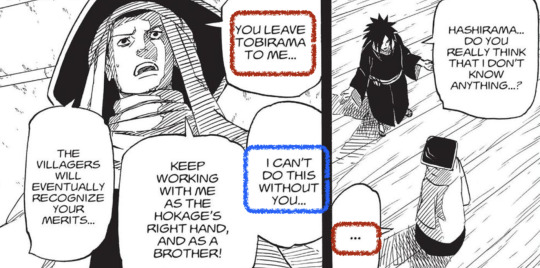
And then I've just got to love Hashirama's reaction to Madara's elucidations circa the duality of these polar opposite force, light and shadow, cooperation and conflict:
Dot, dot, dot... ... something something, the obvious and embarrassing elephant in the room that I've politely ignored and that's gone unacknowledged for several years now, deary me...
You leave Tobirama to me...
Hashirama knows that the bone of contention here is his brother's conniving ways, that this lack of collaboration is, for Madara, a point of rupture between himself and the village (I'll elaborate on this further, in seperate meta.)
Just look at the sheer unadulterated disdain here, these two absolutely loathe one another:
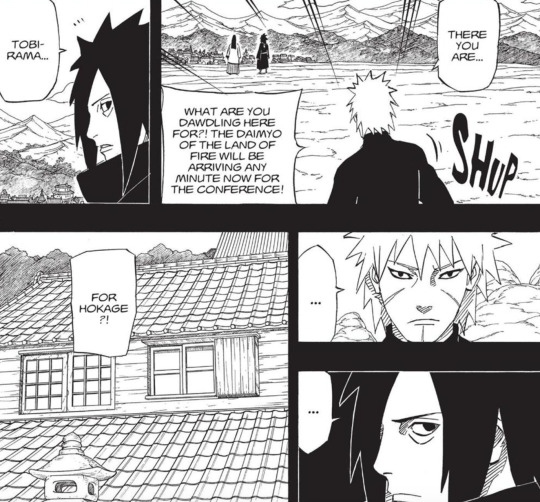
Unsurprisingly, here he's only addressing Hashirama - he couldn't give a rat's arse about Madara and it would hardly surprise me if the latter had been shunned from persuaded into renouncing participation in this roundtable with the daimyo. Senju access only, Uchiha access denied.
Tobirama's very obviously been interfering relentlessly, spoiling Madara's and the Uchiha's reputation, sowing discord between the two clans, and in fact most of what he propagates is based on back-fence talk alone.
Here's an example of his misuse of your run of the mill village hearsay:

"Haven't you heard the rumours about the Uchiha?"
From this, I'd gather that Tobirama hadn't quite begun dabbling in the more obscure regions of fringe pseudo-scientific research, as he has yet to bring to the table his pudding (because the proof is in the pudding, get it? Nevermind), the very same pseudo-science that leads him down the path of eugenics and genetic discrimination, which will later on serve as a basis for the Uchiha's extirpation.
For now, his discourse lacks a clincher, so it's based entirely on rumour:
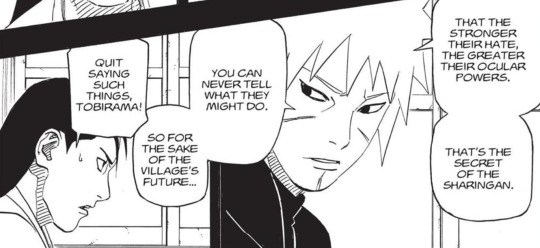
This is the first symptom of Tobirama's disingenuous intent, the very same that later on is force fed into this budding system, buttressing his fascistic hold over the village...
Aversion (or fear) to difference
A fascist or impendingly fascist movement's initial appeal is one against those who are perceived as "foreign", that is to say, a fascist or prematurely fascist movement grows in credence by emotionally leveraging the general populace against an "intruder" (like Hitler did with Jews, Slavs, Roma etc).
This is a practice known as "othering", and it occurs when we draw attention to distinctions between groups of people in an effort to make us more suspicious of them, to belittle them, or to exclude them.
As a result, racism becomes an inherent part of the ideology.
Therefor, fascism grows and seeks consensus precisely by exploiting and exacerbating the natural fear of diversity: which is exactly what Tobirama is doing here, in the above panel.
This very specific rumour, that it's hate that magnifies an Uchiha's ocular power, derives from Tobirama's mouth. He is the perpetrator of these cleverly crafted fabrications, and it's done to create a sense of "otherness", of "us versus them", like a diligent fascist would - It generates an atmosphere of uncertainty and suspicion towards the Uchiha, such that not even Hashirama does much to shut him up.
Now, there are two steps in the othering process:
Indexing a group of individuals into categories based on perceived distinctions such as ethnicity, skin tone, religion, cultural heritage, gender, sexual orientation.
Branding that group as either inferior or threatening, or both, thus sowing dissension with a "us vs. them" mentality.
Focusing on a difference and exploiting it to undermine a feeling of resemblance or connection between individuals is hence known as othering.
By lowering empathy and stifling meaningful conversation, othering prepares the ground for prejudice or worse, persecution. When it is taken to its logical conclusion, othering can lead to one group of people rejecting that another group is even human.
Genocide doesn't occur in a vacuum, but requires years, if not decades, for a political situation to ferment and reach a pinnacle of intolerability.
In due course, this is precisely what occurs to the Uchiha: this ranking of the clan as "threatening to the village", which begins with Tobirama, is a process of othering that contributed massively to create the conditions for the genocide.

"You can never tell what they might do... So for the sake of the village's future..."
They can't be trusted, they're unstable, they're driven by unbridled hate, didn'tcha know? Won't someone please think of the Village!
Tobirama is very much aware of the lengths his brother will go to in order to ensure the village's stability: the dream of Konoha is everything to Hashirama, it's grander than himself, it holds more value than brother, friend or even his very own child ever could.
So he very conveniently brings up this assumed unpredictability at a very crucial moment, one where the two brothers are on the brink of determining Konoha's fate - and sealing their hegemony over it: cunningly, he sways his brother into accepting a fleeting phase of political suffrage by banking on his qualms and misgivings, after all, the village must succeed all:
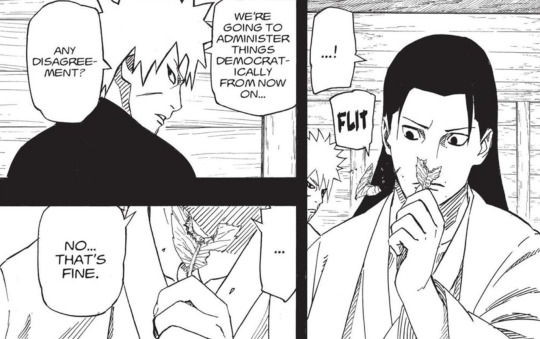
From now on, Leaf's to be administered democratically!
It's only to be a democracy when the threat of Madara becoming leader was a true threat in Tobirama's eyes.
Popular vote will never occur ever again, as it begins and dies with Hashirama: from here on out, the Hokage, who symbolises the most potent military figure within the village and by extension the Land of Fire, is appointed solely via cronyism, and at best with the blessings of wealthy landowners, the daimyo, rather than through the druthers of the general populace (which would be the shinobi themselves).
Selective populism
It's unclear how long the Hokage clutches onto this power, but it seems to be decided by natural life-span or personal discretion, you know, until they feel like it (just as Hiruzen did - I mean, come on, he was a decrepit old fool when he succeeded Minato, couldn't he have just retired and vacated the role for someone fitter for the job? Fugaku anyone? Or, I don't know, popped his clogs off to save us the embarrassment of his second reign?) - it's safe to say that the Hokage remains in power for an indefinite period of time.
And it's not necessarily required they be the optimal choice mind you, qualities such as wisdom, intellectual aptitude, empathy, compassion, honesty are well overlooked; even sheer unadulterated power or ability isn't much appreciated, otherwise Madara would have been next in line after Hashirama - the sine qua non here is that whoever gleans leadership must have a direct connection to the Senju in some capacity.
Hashirama -> Tobirama (self-explanatory) -> Hiruzen (Tobirama's pupil) -> Minato (Jiraiya's pupil, who in turn was Hiruzen's) -> Hiruzen (again) -> Tsunade (Hiruzen's pupil and Hashirama's granddaughter) -> Kakashi (Minato's pupil) -> Naruto (both Kakashi's and Jiraiya's pupil, and Minato's son - also, protagonist of the series, kinda discounted he'd get there eventually)
Now back to the curious case of Nidaime: does anyone seriously expect us to believe that he was selected as Hokage through popular vote in the wake of Hashirama's death, that he somehow managed to garner the sympathy of the Uchiha despite ostracising them?
And yes, his persecution of the clan had begun while Hashirama was still alive, otherwise, why would the First chide him for it, as if he were exasperated at the prospect of having to nag him again, even as an impure shell of a corpse...? Perhaps because he'd griped about it ad infinitum in life? Over and over again, hm?

Or is it more likely that Tobirama affirmed the Senju's ascendance over the village, given his inherent mistrust of that one specific clan, by gradually isolating it and precluding their exponents the possibility of ever reaching political power?
Come on, the answer is so obvious, Madara was remarkably insightful with his predictions after all:
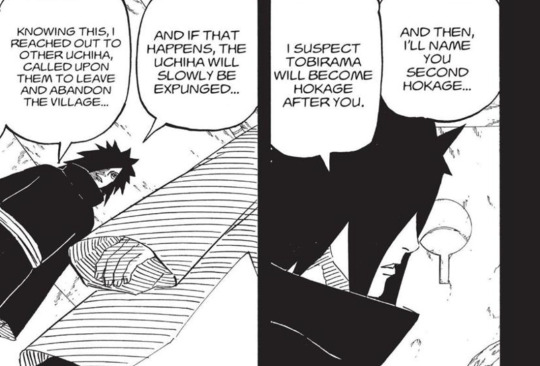
Under fascism, individuals qua individuals have no natural rights, so the "people", or shinobi, is conceived more as a quality, like this monolithic entity that expresses the "common will", which under Tobirama becomes the ideology of Will of Fire (WoF) - and since no shinobi can actually "possess" this common will, it is the supreme leader that claims to be their interpreter.
Having lost their power of delegation (or rather, never having acquired it in the first place if not only in the favour of Hashirama), average shinobis do not express their volition directly, they're simply invoked pars pro toto, to enact the role of the "people" or "citizens" as a sort of collective, or less poetically, the rank and file.
Hence, this request for popular opinion is but a facade:
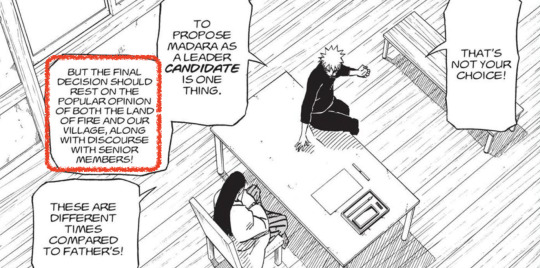
Which leads us to the following...
The rejection of modernism
Same panel, but focus on a different Tobirama quote.
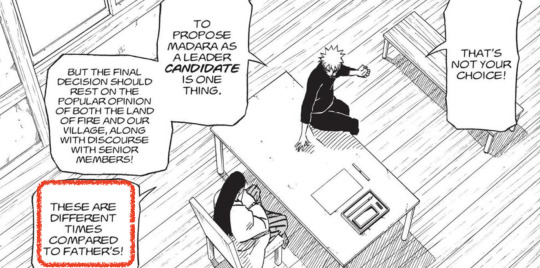
"These are different times compared to fathers!"
Pah, HARDLY! What changed? No, seriously, what fucking changed?
Very little, that's what. With respect to the Warring States Period, the village is negligibly any better, it just centralises violence on a grander scale!
Konoha is still financed by the more conservative landowners, who expected the village to preserve belligerent dynamics: warfare is the prime generator of capital!
And why?
Because instead of the countless chaotic and dispersed mercenary clans that engaged in perpetual conflict, the system just turns out to be a macro state of affairs: the daimyo's still there, aristocratic landowners are still there, the Kage inexplicably obeys their whims, villagers still depended on these for sustenance via the assignment of all kinds of missions, morally sound or otherwise - the shinobi apparatus by design (Tobirama's) still has to rely on a niche elitist rich for economic support: it's not auto-sufficient in any respect.
Ninja are still mercenaries, the difference being they've now systematically organised into secretive (or hidden), discriminative complexes that are categorically segregated from the outside world. That is to say, the villages and shinobi are still clannish in nature, ninja have simply upgraded from provincial war dogs to international warmongers.
So there, Hashirama's dreamland is just an ambitious war machine that thrives off of state-sponsored terrorism, one that's capable of producing mass destruction on a more efficient level.
So when compared to the previous circumstances, again, what fucking changed?
Sure the Leaf was founded in a desperate attempt to control rampant violence, because, as far as Hashirama’s understandings could lead him, unconstrained conflict between mercenary clans was the source of greater bloodshed.
But it never really even crossed his mind, be it because he lacked the foresight, or if you want, pin it down to him forcefully accepting the limits of his vision, the point is he miserably failed to think laterally, revolutionarily, as Madara did, and realise that condensing all violence into a singular superstructure (Konoha) would only result in more widespread, systematic destruction.
Madara was given the assurance by Hashirama that the role of Hokage was to be created with the specific intention of protecting people and above all children. That's what it was all about, protecting their loved ones and watching over them!
Is that what happens? Absolutely not! Despite Madara's obvious warnings, Hashirama ends up relinquishing his "Village of Peace" to a fascist!
Tobirama's the one who architects and defines the determinants of ninja creed (WoF and the tenets the Hokage must abide by - if it wasn't him personally, he at least gave his unfiltered opinion in quality of Hashirama's advisor, so it's not like it makes much difference) and military establishment: academy, chunin exams, shinobi ranking, the Konoha military police force, ANBU which is a faction of specialised shinobi granted special permission for roles such as seek and destroy and espionage etc.
Everything he devised, ideology, shinobi credo, infrastructure, it all revolves around strategic military brutality, and warfare. And the most horrific dimension in all of this? How the village takes advantage of children and subjugates in order to transform them into weapons.
Children are still exploited for military machinations: Konoha's bloody history is rife with tales of kiddie soldiers, just barely weened off their mother's teats, who've suffered mind-numbing WoF indoctrination and are sent on the battlefield to die.
Children still serve as canon fodder, just like in his father's times.
In a way, Tobirama's traditionalism implies the rejection of modernism.
Now, while fascism did revere technological advancement and the movement was proud of its industrial prowess, this was simply the surface manifestation of a philosophy rooted in "blood" and "earth".
Notice the parallels with Tobirama's supremacy? Replace "technology" with Jutsu, and "blood and earth" with "Will of Fire" and it becomes self-explanatory...
Now, on to part 2!
289 notes
·
View notes
Note
Hey :3
If you are still answering some questions,
I was wondering how you understand Madara's behavior in that manga scene where he is in front of Onoki (flashback scene) and him telling others not to mention Hashirama ?
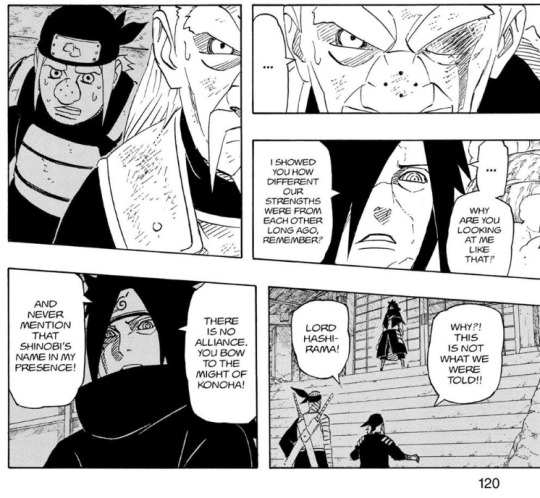
A peak into Madara's confrontation with Onoki / Mu
So here's the specific chapter you're referring to - obviously, what immediately strikes as emblematic is Madara's iconic declaration of hostility:
"You bow to the might of Konoha!"
and then, naturally, his following admonishment:
"Never mention that shinobi's name in my presence!"
Long post!
I think it's crucial to point out three interesting details, the first being that Madara is depicted wearing a hitai-ate with the symbol of the Leaf clearly engraved upon it. It's a rarity to see him donning Konoha's symbolism. Based on this alone, I think we can safely assume that this disastrous encounter transpires well after the treaty, the founding of the village and the nomination of the Hokage role, though the specific time-lapse is unknown (I'll go back to this further along the post).
The second detail which caught my eye is that Madara distinctly mentions 'Konoha's might'.
Not 'My might' and neither 'The Uchiha's might'. It's a curious shift in the manner in which he expresses himself, quite uncharacteristic judging by what we've seen of him in Hashirama's reminiscent vision - it would appear that Madara's role here is to render himself manifest as an instantiation of Konoha's overwhelming power, not as an ambassador with pacific intentions.
The final detail to note is that battle has not yet commenced between the two opposing parties: the building which appears in the background is initially intact whereas in the successive chapters pertaining to Onoki's flashback, it's shown that all seems to be in a ruinous state of disarray, the temple crumbling, utterly destroyed as demonstrated in the successive panels of Onoki's memory:

I'd argue this is important when considering how Madara initially presents himself. Madara doesn't waste time in pointless semantics, he makes a point of emphasising his intentions - bearing down upon them in a very dominant pose, he states that they are to bow to the might of Konoha, implying that :
1) The hidden village is already a tangible reality with a concise identity. In fact, not only is the appearance of his headband with the symbol of the Leaf is telling, Onoki too also dons a hitai-ate relative to his village, further substantiating my point: we can infer that other clans, pertaining to other lands and under the rule of different daimyos, have mimicked the Leaf and created their own versions of these shinobi settlements. Again, I'd rule out that Madara was sent here as an envoy to recruit more exponents.
2) At this historical point in time, Konoha is a power to be reckoned with. The hidden village that Madara and Hashirama gave life to is no longer in its primordial phases but has progressed and evolved into something that encompasses multiple clans and most probably has a defined gubernatorial internal structure - it is an affirmed entity, not something still treading in its unsure baby steps.
This inevitably implies that the confrontation between Madara and the Iwagakure shinobi occurs not only after Hashirama has been appointed hokage, like I said earlier, but after Madara overheard the conversation held between the Senju brothers.
I'm sure that Madara here is operating as the Hokage's right hand man, though it's difficult to assess whether or not the duel that ensues was a result of Madara's poor diplomatic skills or if perhaps subduing the opponents and forcing them into prostration to the Leaf, be it through persuasive discourse or brute force, was indeed the main mission (I headcanon the latter).
It's curious that Hashirama is often depicted as a lovable fool, because he was anything but - he was both a very charismatic, confident leader and a supreme fighter who was well versed in strategics; neither was he a complete idiot, after all, he kept the nine tails for himself, a bijuu that was notoriously more powerful than the others, assuring the village's upper-hand in terms of raw military power.
The thing is, it wouldn't surprise me in the slightest if Hashirama had utilised Madara as a delegate, who's also shown to travel solo for this specific mission, safe in the knowledge that the Uchiha would be more than capable of handling things with his own devices. Again, the fact that he is apparently unaccompanied and wearing armor would lead me believe that the reason behind such a mission had nothing to do with discrete, tactful conciliatory politics. He wasn't visiting them for afternoon tea and a pleasant chat, that's for sure.
Finally, the battle culminates with the defeat of both Onoki and Mu as Madara shatters Onoki's will to, figuratively, 'keep dancing' :
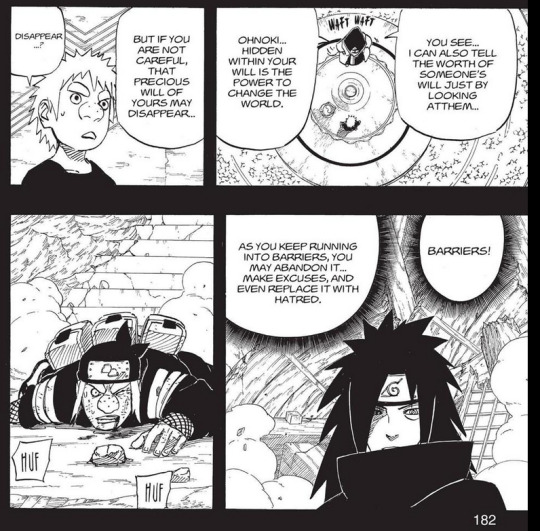
I like this panel a lot.
Madara is a very expressive character, his emotions often transpire through his facial features more than through his words as he often doesn't explain himself to others (with the exception of Hashirama). When he experiences severe distress, we're shown and again not necessarily through words - he communicates through subtle gestures and glances. When he feels the thrill of a fight, it's very obvious; his love of battle, particularly one-on-one clashes, is a well known fact and he manifests this fervent passion with some of most outrageous and near-deranged expressions we've seen in the manga [insert that gif where Madara's eyes expand beyond human capability, similarly to how a cat's does when hunting], coupled with unbridled war cries.
So I think that his downcast gaze is quite indicative of his inner, roiling emotions - naturally, this could be me misinterpreting, but I think the last frame is still very evocative, especially if we compare his characteristic glare displayed in the upper panel(s).
His expressions here are stern. His body language seems strangely guarded as he's keened at a slight angle. Not only does his mouth not bend in an illusive smile of victory as we'd expect, it's only barely visible and it's very much the opposite, a sort of despondent frown. He does not look satisfied with the outcome of their altercation.
To me, he looks like a man who is utterly disillusioned.
The words accompanying this frame seem to add some weight to my claim:
"... make excuses for it and even replace it with hatred."
I don't think this is said with random casualness, the mention of the concept of "hate" coming to supersede that of "will" held a profound meaning to Madara specifically so I wonder if these words, spoken by Onoki's master, are perhaps an illusion to Madara, as if he were speaking them himself (probably) - after all, his relationship with Hashirama was shown to be quite fragile and we all know how it gradually declined until it finally shattered.
If we think about it, Madara did make many an exception for Hashirama and continuously suffered disappointment after disappointment (or barrier) because of his nakama's incapability in seeing his promises through - by this point it's like that he had come to a terrible realisation, that he had internalised a damning sentiment : that the village, this shinobi system, this shared dream he once believed, had not at all turned out to be what he had desired, hence his fierce words:
"Never mention that shinobi's name in my presence!"
I see it as a phrase rife with resentment and bitterness - why else would he feel such hostility towards the person who embodies the closest thing to a brother?
Madara here is a man who's dream is breaking and it'll be his downfall.
War is war, and war never changes and neither do the men who are born and bred to perpetuate it. To think Hashirama was an endearing little mushroom who could do no wrong is such a simplistic vision of his character and it attributes an excessive naivety to him - he was a war chief. Tobirama was a war chief. So was Madara. They all were. Their primary language of communication was through a clash of swords. Sure, Hashirama was lenient towards Madara, but he made certain exceptions only with him, in specific scenarios, and only because a deep-rooted kinship existed between them - I doubt he was truly all that indulgent towards hostile villages that threatened the Leaf's stability and/or existence. Hashirama's compassion ends when Madara refutes the village - because the village is everything to Hashirama: it is above and beyond the love for his brother, the love for his friend, the love for his own child (and yes, if we take a peek at the timeline, Hashi was already a father therefor this child he references is not hypothetical - either that, or Kishi fucked something up). The Will of Fire and its passing down from generation to generation is greater even than himself and it's certainly greater than Madara. Hashirama believes in it above all else.
I'm not saying that Madara was reluctant or disproved of these means and demands to render Iwagakure subservient in regards to Konohagakure, that would be blind, wishful thinking on my behalf - what I'm saying is that Hashirama most probably saw eye to eye on this front. Much like Hiruzen would utilise Danzo to handle ethically abhorrent State affairs, I don't see why Hashirama wouldn't do the same with Madara.
The thing is, we tend to purify our favorite characters and fabricate excuses for them (I know I do the very same with Madara), but it's important to take a step back and acknowledge their limits; after all, these characters are (fictionally) human and abide by the laws of mortal, fallible man.
Conversely, the same goes for how people generally perceive Madara; I feel he's excessively demonised, especially when he's compared in counterpoint to the magnanimous effigy they've created of Hashirama.
We tend to forget that humans are walking contradictions, multifaceted and quite literally a linear combination of antithetical aspects and qualities. Hashirama was not a saint and Madara was not the embodiment of wickedness.
Even if Madara had taken things into his own hands, are we sure that Hashirama wouldn't have approved of his approach? I'm convinced he would not have insisted Madara continue to fill his role as the Hokage's main advisor, or shadow if you will, if he didn't believe in his competence and stratagems.
I've also often seen people blame Madara's incendiary brashness as the prime catalyst that triggered the beginning of the great war between the five nations, so I'd like to talk about that as well.
What we do know however, was that said war was a result of major imbalances between countries and their respective hidden villages, some resorting to taking resources from others (harvest, forbidden scrolls etc) - There is almost always an economically-driven purpose underlying most armed conflicts, even if the stated aim of the war is presented as something more noble (we call that propaganda in this house hold). It's important to remember that all shinobi villages abide by the daimyos whims; subtracting wealth from neighboring countries by incursion was a thing. Poor countries, countries like the land of wind that were barren and basically consisted in endless depleted landscapes, relied on military incursions and the use of their bijuu to provide for the nation.
Madara as the main cause for war? Nah, it's farfetched.
As far as timelines go, the first Kage summit occurred successively to Madara's defection and demise by the blade of his nakama. Considering that peace was established between the five nations, albeit for a limited time and during which the bijuu were supposedly 'equally' distributed between nations, I doubt that Madara's irruption into Iwagakure could have represented a genuine cause for the First Shinobi World War.
BONUS:

So was that Madara's attempt at showing some brand of mercy? Considering his sheer destructive power, he could have easily have smited both ninjas with unparalleled force, obliterating their bodies and their wills... Yet, for some reason, he chose not to.
Persephone 🌻
326 notes
·
View notes
